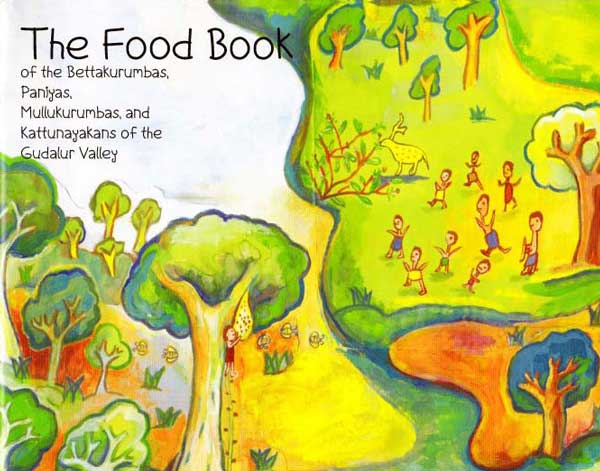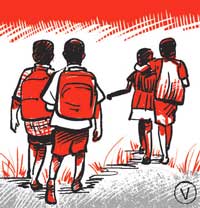“The smart boy or clever girl who is deprived of the opportunity of schooling, or who goes to a school with dismal facilities (not to mention the high incidence of absentee teachers), not only loses the opportunities he or she could have had, but also adds to the massive waste of talent that is a characteristic of the life of our country.” – Nobel Awardee Amartya Sen in The Argumentative Indian (Penguin Books, 2005), p. 344 | Find this and other books published in India >>
Related: Tribal Children’s Right to Education | Childhood | Ekalavya (Eklavya, Eklabya), EMR & Factory schools | Childrens rights: UNICEF India >>
Kerala’s Out-Of-The-Box Solution for Tribal Literacy May Be Just What It Needs!
Instead of state-commissioned teachers, the new literacy drive will train the ‘preraks’ from these regions, who can take the learning to their own settlements and educate their community. […]
About 350 instructors have been identified by KSLMA, out of which as many as 100 hail from areas with very little or probably no educational reach.
“The tribal instructors who have been selected for the scheme are those with minimum educational qualifications. No such comprehensive scheme has been previously formulated elsewhere in the country towards tribal welfare. It is not just education that we are envisioning through this drive but more importantly, various life skills that will help bridge the blaring gap between both worlds,” says Pradeep Kumar, one of the officials associated with the mission to The Better India.
Source: “Kerala’s Out-Of-The-Box Solution for Tribal Literacy May Be Just What It Needs!” by Lekshmi Priya S, The Better India, 22 March 22 2018
URL: https://www.thebetterindia.com/135327/kerala-out-of-box-solution-tribal-literacy/
Date Visited: 7 March 2022
Up-to-date reports by Indian journalists and commentators
To search Indian periodicals, magazines, web portals and other sources safely, click here. To find an Indian PhD thesis on a particular tribal community, region and related issues, click here >>
Search tips
Combine the name of any particular state, language or region with that of any tribal (Adivasi) community.
Add keywords of special interest (music, poetry, dance just as health, sacred grove and biodiversity); learn about the rights of Scheduled Tribes such as the “Forest Rights Act” (FRA); and the United Nations “Declaration on the Rights of Indigenous Peoples”, “Universal Declaration of Human Rights”, “women’s rights”, or “children’s right to education”.
Specify any other issue or news item you want to learn more about (biodiversity, bonded labour and human trafficking, climate change, ecology, economic development, ethnobotany, ethnomedicine, global warming, hunter-gatherers in a particular region or state, prevention of rural poverty, water access).
For official figures include “scheduled tribe ST” along with a union state or region: e.g. “Chhattisgarh ST community”, “Himalayan tribe”, “Scheduled tribe Tamil Nadu census”, “ST Kerala census”, “Particularly Vulnerable Tribal Group Jharkhand”, “PVTG Rajasthan”, “Adivasi ST Kerala”, “Adibasi ST West Bengal” etc.
In case the Google Custom Search window is not displayed here try the following: (1) toggle between “Reader” and regular viewing; (2) in your browser’s Security settings select “Enable JavaScript” | More tips >>
Note: hyperlinks and quotes are meant for fact-checking and information purposes only | Disclaimer >>
The Hindu (2011):
Hostel of tribal school under closure threat
[…] The future of 63 tribal students studying at the Champakkad Government Tribal Lower Primary School, inside the Chinnar Wildlife Sanctuary, is hanging in the balance as the authorities are yet to provide recognition to the hostel facility at the school.
The only government school in Kanthalloor grama panchayat, the schools has played a pivotal role in providing education to tribal children from Alampetty, Karimutty, Eechampetty, Puravayal, Palappetty, Pongampally, Vannamthura, Kanakkayam, Pottappallam, Cherukad, Muniyara and Dhandukombu settlements. However, due to the alleged delay in getting recognition from the District Tribal Project Officer, the hostel at the school is under threat of closure.
As the inmates of the hostel belong to remote forest settlements, they will have to discontinue their studies once the facility is closed down, according to members of the school Parent Teacher Association (PTA).
The school that is situated 15 km away from Marayur was established in 1958 to provide education to the children of Hill Pulaya [Malappulayan] tribes. […]
Gopakumar, president, PTA, said that if the hostel was not provided immediate recognition, they would have to send the 63 inmates back to their kudis, which might derail their studies. […]
Source: The Hindu : Education / School : Hostel of tribal school under closure threat
Address : http://www.thehindu.com/education/school/article2369856.ece
Date Visited: Thu Sep 01 2011 13:23:30 GMT+0200 (CEST)
Update in The New Indian Express, 12 September 2021:
A Kerala teacher’s tale of transforming lives >>
[Bold typeface added above for emphasis]
“The Big-brother attitude of educators must end. The approach to tribal education has to be a two-way transaction of give and take, based on an informed appreciation of traditional tribal values and wisdom.” – Uma Ram (Professor & Head Department of English, Kakatiya PG College, Chhattisgarh) in Issues in Tribal Education in Bastar, Chhattisgarh (Folklore Foundation, Lokaratna, Volume IV 2011)
Residential, Ashram and Factory schools
- Ekalavya* Residential School Scheme (EMR): a network of boarding schools where tribal children are to be educated in accordance with rules and syllabi provided by the government; such schools are being designated as “Eklavya Model Residential School (EMR)” with the objective of empowering students “to be change agent, beginning in their school, in their homes, in their village and finally in a large context.” – Government Guidelines 2010 | Backup >>
- Residential School and Ashram School
In some regions there are similar “Residential Schools” and “Ashram Schools” for tribal children, as in Tripura where they are managed by a society called “Tripura Tribal Welfare Residential Educational Institutions Society (TTWREIS)” – Tribal Welfare Department, Government of Tripura - Factory schools “exist to turn tribal and indigenous children – who have their own language and culture – into compliant workers-of-the-future. The world’s largest Factory School stated that it turns ‘Tax consumers into tax payers, liabilities into assets’.” – survivalinternational.org/factoryschools | Learn more >>
Up-to-date information about these and related issues: Safe custom search engine >>
* Ekalavya (Eklavya, Eklabya): the name of a legendary archer prodigy “who, being a Nishada [Sanskrit Niṣāda, “tribal, hunter, mountaineer, degraded person, outcast”], had to give his thumb as a fee to the brahmin guru thus terminating his skill as an archer.” – Romila Thapar (“The epic of the Bharatas”) | Read the full paper here | Backup download link (pdf) >>
Note: “Forcibly transferring children of the group to another group” amounts to genocide, which the United Nations Office on Genocide Prevention defines as “acts committed with intent to destroy, in whole or in part, a national, ethnical, racial or religious group” (Article II, d & e)
Learn more about Childrens rights: UNICEF India | Ekalavya (Eklavya, Eklabya), EMR & Factory schools | Rights of Indigenous Peoples >>
See also
Adverse inclusion | Casteism | Rural poverty
Demographic Status of Scheduled Tribe Population of India (Census figures 2011)
Fact checking | Figures, census and other statistics
Human Rights Commission (posts) | www.nhrc.nic.in (Government of India)
Search tips | Names of tribal communities, regions and states of India
“What is the Forest Rights Act about?” – Campaign for Survival and Dignity
“Who are Scheduled Tribes?” – Government of India (National Commission for Scheduled Tribes, NCST)
See also
Biodiversity and development – Kerala
Childhood – Kerala | Childrens rights: UNICEF India | Safe search
Childrens rights: English or Malayalam (UNICEF India)
eBook | Background guide for education
Education and literacy | Right to education
Kerala | State wise ST list (Scheduled Tribes)
Recommendations by the Expert Committee on Tribal Health
Tribal schools and educational projects – Kerala
Video | M.S. Swaminathan on Biodiversity and the sharing of resources
Video | Trailer to “Have you seen the arana?” – Kerala
Vulnerable tribal groups – Kerala
Women | Safe search | President Droupadi Murmu on women’s empowerment

